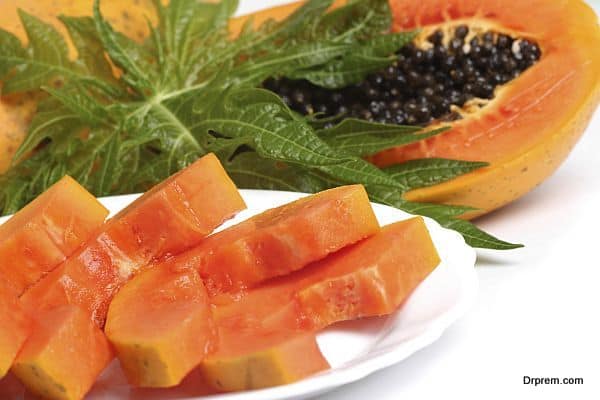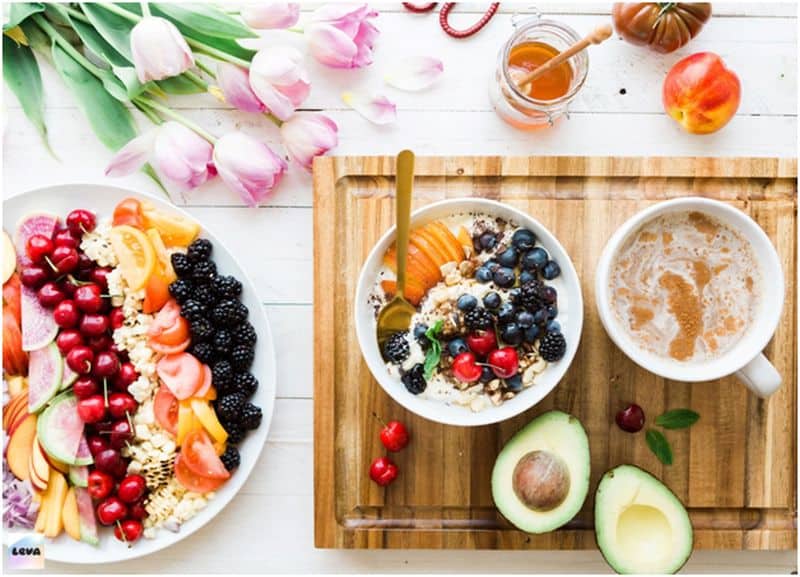We have all heard that chicken soup and hot tea are the best ways to get rid of your disease when you are sick. Can food, on the other hand, actually make you feel better? Can eating, perhaps more crucially, prevent you from becoming ill in the first place?
A healthy immune system aids in the prevention of disease. Is it possible to improve your immune system by eating certain foods?
As per Pain Management, the immune system responds to a pathogen when it comes into touch with it. Antibodies are produced by the immune system and bind to pathogen antigens, killing them.
When included in one’s diet, specific foods can help boost one’s immune system. Continue reading to learn about how I make cooking more accessible when living with chronic pain or foods that can help to strengthen your immune system.
What foods help the immune system to function better?
A well-balanced diet is necessary for staying healthy. The following foods can help to improve your immune system:
1. Garlic

Garlic is a widely used home treatment for colds and other illnesses.
One study looked into whether taking allicin-rich garlic supplements reduced the likelihood of catching a cold.
Participants who took a placebo experienced more than twice as many colds as those who took garlic pills. However, according to the experts, further research is needed to discover whether garlic can help prevent colds.
2. Broccoli
Vitamins and minerals abound in broccoli. Broccoli is abundant in vitamins A, C, and E and fibre, and a variety of antioxidants, making it one of the healthiest vegetables to eat.
The secret to preserving its power is to cook it as little as possible, or not at all. According to a study, steaming is the best way to keep more nutrients in food.
3. Ginger
After becoming ill, many people resort to ginger as well. Ginger has been shown to lower inflammation, assisting with sore throats and inflammatory disorders. Ginger can also help with nausea.
While gingerol, a relative of capsaicin, is utilised in many sweet treats, it also delivers some heat.
Ginger may also help to relieve chronic pain and may lower cholesterol levels.
4. Spinach
Spinach made our list because of its high vitamin C level and antioxidants, and beta-carotene, which may help our immune systems battle illnesses.
Spinach, like broccoli, should be cooked as little as possible to preserve its benefits. On the other hand, light cooking allows other nutrients to be released from the antinutrient oxalic acid, making it easier to absorb vitamin A.
5. Yoghurt

For instance, on the label of Greek yoghurt, the phrase “living and active cultures” should be printed. By stimulating your immune system, these cultures may aid in the fight against the disease.
Plain yoghurts are preferred to flavored and sugar-laden varieties. Plain yoghurt can be sweetened with fresh fruits and a splash of honey instead.
Look for fortified varieties of yoghurt since these can be a rich source of vitamin D. Vitamin D is known to assist govern the immune system, which improves our body’s natural defenses against illness.
6. Almonds
Vitamin E is usually outperformed by vitamin C when preventing and treating colds. On the other hand, a healthy immune system requires this potent antioxidant.
It’s a fat-soluble vitamin, relying on fat for optimal absorption. Almonds, for instance, are high in vitamin E and beneficial fats.
Vitamin E intake for adults is only 15 milligrammes per day. A half-cup of almonds (about 46 whole, shelled almonds) provides 100% of the daily requirement.
7. Sunflower seeds
Phosphorus, magnesium, vitamins B-6 and E, and other minerals are abundant in sunflower seeds.
Vitamin E aids in the regulation and functioning of the immune system. Other foods rich in vitamin E include avocados and dark leafy greens.
The selenium content in sunflower seeds is high. Half of the selenium required by the average adult is found in one ounce. Several research, mainly on animals, have looked into its ability to fight viral illnesses like swine flu (H1N1).
8. Turmeric
Turmeric is a common ingredient in curries around the world. Anti-inflammatory properties of this bright yellow, bitter spice have long been used to treat osteoarthritis and rheumatoid arthritis.
High amounts of curcumin, the pigment that gives turmeric its unique color, have been shown in studies to help reduce exercise-induced muscle damage. According to animal research, curcumin shows potential as an immune booster and antiviral. More research is required.
9. Green tea

Green and black teas both contain flavonoids, a form of antioxidant. Green tea shines because of its high levels of epigallocatechin gal late (EGCG), a powerful antioxidant.
The immune system has been shown to benefit from EGCG in experiments. A significant amount of EGCG is lost during the fermentation of black tea. Green tea retains its EGCG concentration since it is steamed rather than fermented.
Green tea contains the amino acid L-theanine as well. L-theanine, an amino acid, may aid the production of germ-fighting chemicals by your T cells.
10. Citrus fruits
Most people turn to vitamin C first when they get a cold. This is because it helps your immune system improve.
Vitamin C promotes the production of white blood cells, which are vital in the fight against infection.
Nearly all citrus fruits are high in vitamin C. Adding a squeeze of this vitamin to every meal is simple with so many alternatives.
Citrus fruits that are popular include:
- Lemons
- Grapefruit
- Limes
- Oranges
- Tangerines
- Clementine’s
Since your body neither produces nor stores vitamin C, it is necessary daily. The recommended daily dosage for most individuals is:
- 90 mg for men
- 75 mg for women
Avoid consuming more than 2,000 milligrams (mg) of supplements per day if you choose to take supplements.
In addition, while vitamin C may help you recover faster from a cold, there is no proof that it can protect you from the new coronavirus, SARS-CoV-2.
11. Red bell peppers
If you assume citrus fruits have the most vitamin C of any fruit or vegetable, you are mistaken. A Florida orange has almost three times the amount of vitamin C (127 mg) as a red bell pepper (45 mg). They are also high in beta-carotene.
Vitamin C can enhance the texture of your skin while also boosting your immune system. Your body converts beta-carotene into vitamin A, which helps your eyes and skin stay healthy.
12. Spinach
Spinach hit our list not just, because it is strong in vitamin C but also because it is high in antioxidants and beta-carotene. These two nutrients may aid our immune systems in fighting illnesses.
Spinach, like broccoli, should be cooked as little as possible to preserve its benefits. On the other hand, aids vitamin A absorption and permits other nutrients to be released from the antinutrient oxalic acid.
13. Papaya

Vitamin C-rich papaya is another fruit. In a single medium apple, you can get twice as much vitamin C as you need for the day. Papayas have an anti-inflammatory, a digestive enzyme called papain.
Papayas include significant levels of potassium, magnesium, and folate, all of which are beneficial to your health.
14. Kiwi
Like papayas, kiwis are high in important minerals like vitamin K, folate, vitamin C and potassium.
Kiwis include vitamin C, which helps white blood cells fight illness, and other elements that keep the rest of your body working smoothly.
15. Poultry
While you eat chicken soup when you are sick, it is not just the placebo effect that makes you feel better. The soup may help ease cold symptoms by lowering inflammation.
Chicken and turkey, for example, are high in vitamin B-6. In 3 ounces of light turkey or chicken meat, you will get nearly one-third of your daily B-6 requirement.
Vitamin B-6 is involved in various chemical reactions that occur in the body. It is also necessary to develop new, healthy red blood cells.
Gelatin, chondroitin, and other minerals in stock or broth produced from boiling chicken bones aid intestinal healing and immunity.
16. Shellfish
Many people do not think of shellfish when they want to boost their immune system, yet certain types of shellfish are high in zinc.
Zinc doesn’t get nearly as much attention as other vitamins and minerals, but our immune cells need to operate properly.
Zinc-rich shellfish include the following:
- Lobster
- Crab
- Mussels
- Oysters
Keep in mind that you should not take more zinc than the daily-recommended amount:
- 8 mg for most adult women
- 11 mg for adult men
Conclusion
Choosing a variety of immune-boosting foods is one of the most effective methods to stay healthy.
Eating antioxidant-rich foods like fruits and vegetables, whole grains, and lean protein is crucial for keeping your immune system in good shape and warding off infection and disease.
However, it is crucial to note that the immune system is complicated. One method to support immunological health is to eat a healthy, balanced diet.
Other lifestyle factors that can affect immune system function, such as exercise and stopping smoking, should be taken into account.
Anyone who gets colds or other infections frequently and is worried about their immune system should see a doctor.
Article Submitted By Community Writer




